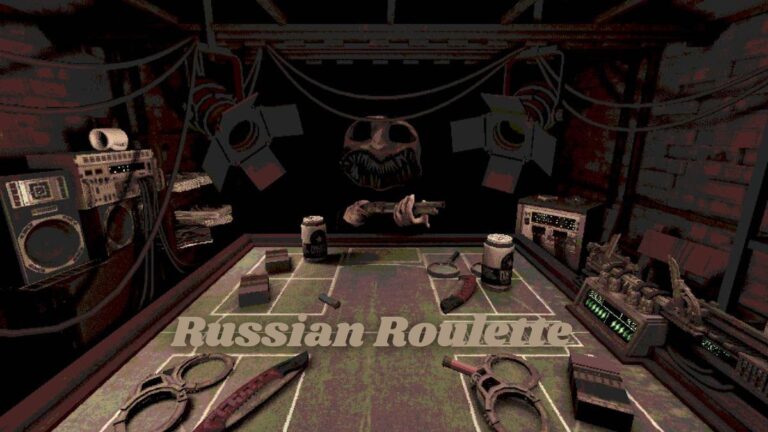Russian Roulette, a game steeped in intrigue and danger, often sparks debate about its nature: Is it a game of skill or a game of chance? Originating from 19th-century Russia, this perilous pastime involves a revolver with a single live round of ammunition and the rest of the chambers empty. The player spins the cylinder, places the gun to their head, and pulls the trigger, risking a potentially fatal outcome. The game has received a mixed rating on steam.
The allure of Russian Roulette lies in its simplicity and the extreme stakes involved. However, this simplicity belies the complex debate surrounding the game’s nature. Is the outcome purely a matter of luck, determined by the randomness of the revolver’s chamber? Or do psychological and strategic elements introduce a layer of skill to the game?
To provide a comprehensive analysis, we’re joined by Indie Dev Chronicles, industry experts known for their in-depth exploration of gaming and risk analysis. They will guide us through the intricacies of Russian Roulette, offering insights into whether skill plays a role or if the game is dominated by chance.
Historical Context
Russian Roulette’s origins are as mysterious as the game itself. The term “Russian Roulette” first appeared in Western literature in the early 20th century, though the game’s roots trace back to 19th-century Russia. The game is believed to have been popularized during a period of intense social and political turmoil in Russia, often associated with the darker sides of human nature and risk-taking behavior.
The game’s concept involves a revolver with a single bullet and a series of empty chambers. The player spins the revolver’s cylinder to randomize the position of the bullet, then places the gun to their head and pulls the trigger. The risk of pulling the trigger on a loaded chamber creates a high-stakes environment that has fascinated and horrified people alike.
In literature and media, Russian Roulette has been portrayed as a symbol of extreme risk and recklessness. The game gained wider attention and notoriety through its depiction in novels, films, and other forms of entertainment, often serving as a dramatic device to explore themes of fate, chance, and human psychology.
Historically, the game’s association with Russian culture has been scrutinized and mythologized. While it’s uncertain whether it was actually a widespread practice in Russia, its name and the dramatized versions in media have cemented its place in popular culture as a macabre and thrilling example of risk-taking.
Read More: Game Development on a Budget: Tips and Tricks
Rules and Mechanics
Russian Roulette is notorious for its simplicity and inherent danger. The game’s rules are straightforward, but the implications are life-threatening, making it a subject of intense fascination and fear.
Basic Rules
Equipment: The game requires a revolver, which typically holds six chambers. In a standard setup, one chamber is loaded with a live round, while the remaining chambers are empty.
Preparation: The player spins the revolver’s cylinder to randomize the position of the bullet. This action ensures that the bullet’s position is unknown and creates an element of chance.
Gameplay: The player places the revolver’s muzzle against their head, pulls the trigger, and hopes that the chamber aligned with the firing pin is empty. If the trigger is pulled and the chamber is empty, the player survives and may choose to continue or end the game. If the chamber contains the live round, the game ends tragically.
Game Mechanics
Probability: With a standard six-chamber revolver and one bullet, the probability of firing the live round on the first trigger pull is 1 in 6, or approximately 16.67%. Each subsequent trigger pull, assuming the cylinder is not spun again, changes the probability based on the remaining chambers.
Randomization: Spinning the cylinder before each trigger pull randomizes the position of the bullet, maintaining the initial 1 in 6 chance each time the trigger is pulled. Without spinning, the probability changes as chambers are either emptied or remain loaded.
Strategic Considerations
Psychological Factors: While Russian Roulette is fundamentally a game of chance, psychological factors may influence players’ behavior. For instance, some players might engage in superstitions or beliefs about luck, which can affect their willingness to continue or stop.
Influence of Skill: Although the game itself does not involve traditional skill elements like strategy or physical prowess, the psychological fortitude required to participate and make decisions under extreme pressure can be considered a form of skill in a broader sense.
Read More: Exploring Devil’s Island: An In-Depth Overview
The Concept of Chance
At the heart of Russian Roulette is the fundamental concept of chance. The game’s design revolves around randomness and uncertainty, making it a compelling example of how probability governs outcomes in high-risk scenarios.
Comparison with Other Games of Chance
Gambling Games: Russian Roulette’s randomness is similar to other games of chance, such as roulette or slot machines. In these games, the outcome is determined by random events, and players must rely on luck rather than skill to win.
Risk Management: Unlike traditional gambling games, where players can employ strategies or systems to manage risk, Russian Roulette offers no such options. The game’s outcomes are purely based on chance, making it a stark example of high-risk gambling with no control over the result.
The Concept of Skill
While Russian Roulette is primarily a game of chance, there are elements where skill—or more precisely, psychological factors—might play a role. Understanding these aspects can offer insight into whether skill influences the game or if it remains purely a matter of luck.
Psychological Resilience
Mental Fortitude: Players who engage in Russian Roulette must possess significant psychological resilience. The ability to manage stress, fear, and anxiety is crucial in enduring the high-stakes environment. While this doesn’t change the probability of the outcome, it affects how a player experiences and reacts to the game.
Decision-Making Under Pressure: The capacity to make decisions under extreme pressure can be seen as a form of skill. Players may employ mental strategies to cope with the fear and anxiety of each trigger pull. This psychological management can influence their behavior and choices during the game.
Behavioral Strategies
Superstitions and Beliefs: Some players might develop superstitions or rituals they believe influence their luck. While these beliefs do not alter the probability of hitting the live round, they can affect the player’s mindset and approach to the game.
Risk Perception: The way players perceive and handle risk can also be considered a skill. Individuals who are more comfortable with high-risk situations may approach the game differently from those who are more risk-averse.
Influence of External Factors
Peer Pressure and Social Dynamics: In certain contexts, Russian Roulette is played as a result of peer pressure or social dynamics, which can influence a player’s decision-making process. While this external influence does not change the inherent randomness of the game, it affects the social and psychological context in which the game is played.
Comparison with Other High-Stakes Games
Skill-Based Elements: Unlike traditional games where skill directly influences the outcome—such as poker or chess—Russian Roulette’s outcomes are determined by chance. However, the mental and emotional skills required to endure the game’s stress can influence a player’s experience and willingness to continue.
Read More: Top 6 Best Sites to Purchase Retro Games Online
Analysis of Game Theories
Game theory provides a framework for analyzing strategic interactions and decision-making under risk. Applying game theory to Russian Roulette offers valuable insights into the nature of risk, choice, and strategy in this high-stakes game.
Game Theory Basics
Definition and Purpose: Game theory is the study of mathematical models of strategic interaction among rational decision-makers. It helps analyze how players make decisions in competitive and cooperative environments, considering the possible choices of others and the associated risks and rewards.
Application to Russian Roulette: In the context of Russian Roulette, game theory can be used to analyze the decision-making process, particularly how players evaluate their risk and make choices under uncertainty.
Risk and Decision-Making
Risk Assessment: Russian Roulette involves a single player making decisions under high risk. The primary risk is the potential fatal outcome if the live round is fired. Game theory can model how players assess and respond to this risk, including the psychological factors influencing their choices.
Optimal Strategy: Although Russian Roulette doesn’t have a traditional “optimal strategy” due to its extreme risk and randomness, game theory can explore the concept of risk aversion. Players might weigh the thrill of the game against the potential consequences, influencing their decision to participate or continue.
Read More: Using Discord to Boost Your Indie Game Marketing Strategy
Final Thoughts
Russian Roulette epitomizes the tension between chance and psychological resilience in high-risk scenarios. Beyond the math, the mental fortitude required to participate reveals the complex interplay of mind and risk. Applying game theory offers insights into decision-making under extreme pressure, while the ethical implications highlight the serious harm potential and societal impact. Russian Roulette is more than a mere game; it is a profound exploration of human psychology, risk, and ethics.


